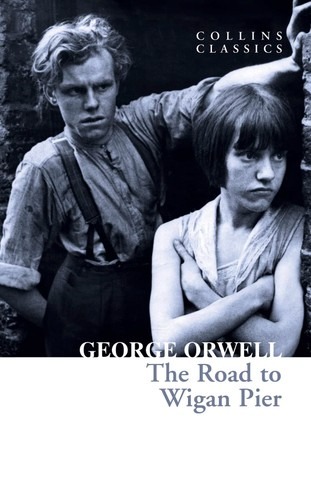The Road to Wigan Pier (Collins Classics)
700,00 د.ج
HarperCollins is proud to present its incredible range of best-loved, essential classics.
If there is one man to whom I do feel myself inferior, it is a coalminer.
In the mid-1930s, George Orwell was given an assignment from his publisher – to write a book about unemployment and social conditions in the economically depressed north of England. Revolutionary for its time, The Road to Wigan Pier documents Orwell’s stint in towns likes Barnsley, Sheffield and Wigan in 1936, where he met and observed working-class people living in the bleak industrial heartlands of Yorkshire and Lancashire.
Orwell graphically and emphatically describes the hardships of ordinary people living in cramped slum housing, working in dangerous mines and growing hungry through malnutrition and social injustice. It is an honest, gripping and humane study that also looks at socialism as a solution to the problems facing working-class northerners – something many readers at the time were uncomfortable discussing.
The Road to Wigan Pier cemented ideas that would be found in Orwell’s later works, and remains a powerful portrait of poverty, injustice and class divisions in Britain to this day.
HarperCollins is proud to present its incredible range of best-loved, essential classics.
If there is one man to whom I do feel myself inferior, it is a coalminer.
In the mid-1930s, George Orwell was given an assignment from his publisher – to write a book about unemployment and social conditions in the economically depressed north of England. Revolutionary for its time, The Road to Wigan Pier documents Orwell’s stint in towns likes Barnsley, Sheffield and Wigan in 1936, where he met and observed working-class people living in the bleak industrial heartlands of Yorkshire and Lancashire.
Orwell graphically and emphatically describes the hardships of ordinary people living in cramped slum housing, working in dangerous mines and growing hungry through malnutrition and social injustice. It is an honest, gripping and humane study that also looks at socialism as a solution to the problems facing working-class northerners – something many readers at the time were uncomfortable discussing.
The Road to Wigan Pier cemented ideas that would be found in Orwell’s later works, and remains a powerful portrait of poverty, injustice and class divisions in Britain to this day.
| Editeur |
|---|
Produits similaires
The Uninhabitable Earth: A Story of the Future
'An epoch-defining book' Matt Haig
'If you read just one work of non-fiction this year, it should probably be this' David Sexton, Evening Standard
It is worse, much worse, than you think.
The slowness of climate change is a fairy tale, perhaps as pernicious as the one that says it isn't happening at all, and if your anxiety about it is dominated by fears of sea-level rise, you are barely scratching the surface of what terrors are possible, even within the lifetime of a teenager today.
Over the past decades, the term "Anthropocene" has climbed into the popular imagination - a name given to the geologic era we live in now, one defined by human intervention in the life of the planet. But however sanguine you might be about the proposition that we have ravaged the natural world, which we surely have, it is another thing entirely to consider the possibility that we have only provoked it, engineering first in ignorance and then in denial a climate system that will now go to war with us for many centuries, perhaps until it destroys us. In the meantime, it will remake us, transforming every aspect of the way we live-the planet no longer nurturing a dream of abundance, but a living nightmare.
In Cold Blood
An alternate cover of this ISBN can be found here.
An Anthropologist on Mars
Dear Ijeawele, or a Feminist Manifesto in Fifteen Suggestions
A few years ago, Chimamanda Ngozi Adichie received a letter from a dear friend from childhood, asking how to raise her new baby girl a feminist.
Although she has written and spoken out widely about feminism, Adichie wasn't sure how to advise her friend Ijeawele. But as a person who'd babysat, had loved her nieces and nephews, and now, too, was the mother of a daughter herself, she thought she would try. So she sent Ijeawele a letter with some suggestions--15 in all--which she has now decided to share with the world.
Compelling, direct, wryly funny, and perceptive, Dear Ijeawele offers specifics on how we can empower our daughters to become strong, independent women. Here, too, are ways parents can raise their children--both sons and daughters--beyond a culture's limiting gender prescriptions. This short, sharp work rings out in Chimamanda's voice: infused with deep honesty, clarity, strength, and above all love. She speaks to the important work of raising a girl in today's world, and provides her readers with a clear proposal for inclusive, nuanced thinking. Here we have not only a rousing manifesto, but a powerful gift for all people invested in the idea of creating a just society--an endeavour now more urgent and important than ever.









